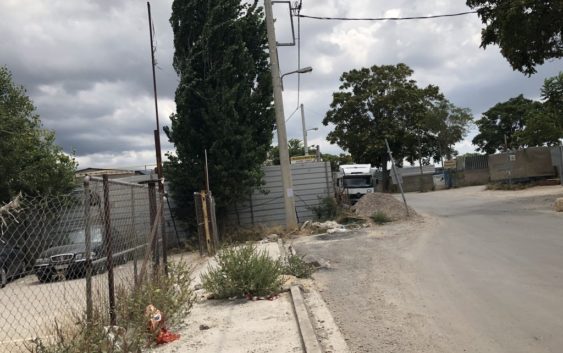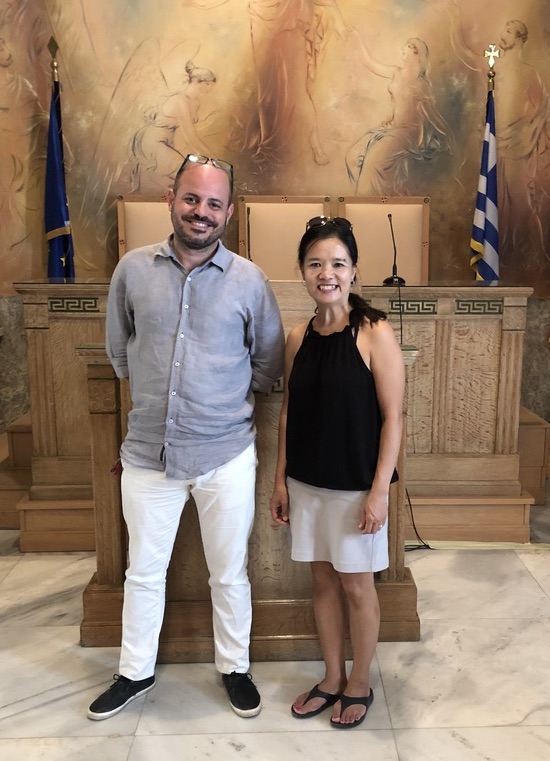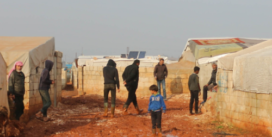- Fall Newsletter, 2025, Issue 15
- Using International Online Learning Modules to Engage Students in the Study of Critical Global Issues
- Upcoming Book Launch: Hearts of Freedom
- Announcing winners of the 2025 CARFMS Essay Contest
- The New York Declaration for Refugees and Migrants and its two Global Compacts: Addressing the Symptoms or the “Root Causes” of Forced Displacement?*
Striving to Achieve International Justice Through the Protection of Refugees: The Challenges for Greece and the European Union

by Stephanie P. Stobbe and James C. Simeon
 Dr. Stephanie P. Stobbe, Associate Professor, Conflict Resolution Studies, Menno Simons College (a College of CMU) at the University of Winnipeg, s.stobbe@uwinnipeg.ca
Dr. Stephanie P. Stobbe, Associate Professor, Conflict Resolution Studies, Menno Simons College (a College of CMU) at the University of Winnipeg, s.stobbe@uwinnipeg.ca
 Dr. James C. Simeon, Associate Professor, Head of McLaughlin College, and School of Public Policy and Administration, Faculty of Liberal Arts & Professional Studies, York University, jcsimeon@yorku.ca
Dr. James C. Simeon, Associate Professor, Head of McLaughlin College, and School of Public Policy and Administration, Faculty of Liberal Arts & Professional Studies, York University, jcsimeon@yorku.ca
International justice should be the prime objective of all of us. It has been commonly defined as involving the world community of States striving to ensure that people are dealt with in the right and fair way.[1] It has also been defined as the system of laws in the world community of States that judges and punishes people who have committed injustices.[2] We ought to be mindful that there are different types of justice such as distributive, procedural, retributive, and restorative.[3] There is also transitional justice.[4] And, justice surely ought to be embodied in the law, whether it is international, transnational, national or municipal law. Numerous international instruments provide protection to refugees include the 1948 Universal Declaration of Human Rights (UDHR), 1951 Convention relating to the Status of Refugees and its 1967 Protocol.[5] Additionally, other international, regional, and national institutions and organizations have their role to play in ensuring that “people are dealt with in the right and fair way.” For example, the United Nations (UN) and its agencies, the International Committee of the Red Cross (ICRC), Human Rights Watch (HRW), Amnesty International (AI), the European Union (EU), African Union (AU), Organization of American States (OAS), and the Association of Southeast Asian Nations (ASEAN), the Sierra Club, the Canadian Environmental Law Association (CELA), War Child UK, Greenpeace USA, to name but a few, can assist in addressing the injustices.
Amnesty International (AI) states that, “International justice means ensuring accountability for some of the most serious crimes: genocide, crimes against humanity, war crimes, torture and enforced disappearances.”[6] AI identifies five mechanisms that are used to uphold international justice: the International Criminal Court (ICC); hybrid courts; ad hoc courts (only two have been established thus far – the International Criminal Tribunal for the Former Yugoslavia and the International Criminal Tribunal for Rwanda); other mechanisms such as the 2016 UN General Assembly body has been established to gather evidence of violations in the Syrian Civil War to support criminal proceedings in national, regional and international courts; and universal jurisdiction.[7] The International Federation for Human Rights (fidh) and Human Rights Watch (HRW) utilize essentially the same definition of international justice as AI. In the case of fidh, it is:
Promoting international justice to fight impunity for the most serious crimes (genocide, crimes against humanity, war crimes, torture, enforced disappearance) [that] contributes to restoring respect for human rights and the rule of law in our societies and to upholding victims’ rights.[8]
In fact, HRW takes the position that “international justice – accountability for genocide, war crimes and crimes against humanity – is an essential element of building respect for human rights.”[9]
However, international justice is far more than this. It includes how States treat those who arrive on their territory seeking asylum. It is the way that States, together through their multi-lateral collaboration and treaties, organize themselves to deal with the massive, forced displacement in the world today. With over 80 million people forcibly displaced and less than one percent of the world’s refugee population being resettled in third countries,[10] international justice ought to be what drives and motivates our current international refugee protection regime. The world’s most vulnerable people should be “dealt with in the right and fair way.”[11] To illustrate this point, Stephanie Stobbe has offered a case study of the situation in Greece, in a forthcoming book chapter entitled, “The European Refugee Crisis and Its Human Rights Impact on Forced Migrants in Greece,”[12] that will be drawn upon here to demonstrate the need for international justice in addressing the protection of refugees and asylum seekers.
Stobbe’s research examines: (1) How Greece is addressing the mass inflow of refugees, asylum seekers and other forced migrants; (2) What programs and services are available to help integrate refugees; (3) How Greece is meeting its obligations to integrate refugees; and (4) How Greece, Europe, and the global community can collaborate to address the refugee crisis. Semi-structured interviews were conducted with the Vice-Mayor of Athens, the UNHCR Greece Liaison Associate, Canadian Embassy Counsellors, and National and International NGOs, that showed how Greece and the EU were not living up to international justice standards of dealing with forced migrants in “the right and fair way.” The 1951 Refugee Convention is based on the 1948 Universal Declaration of Human Rights, Article 14, that asserts the right of persons to seek asylum from persecution in other countries. It is the centerpiece of international refugee protection and the most comprehensive codification of the rights of refugees at the international level. Its fundamental principles include non-discrimination, non-penalization, and non-refoulement.
Stobbe argues that one of the main international injustices is the 2016 EU-Turkey Refugee Statement where Turkey agreed to prevent new sea and land routes for irregular migration via Turkey to Europe. Under the terms of the Refugee Statement, Greece would return irregular migrants or failed asylum seekers who arrive on the Greek islands from Turkey, and the EU would resettle one Syrian for every Syrian being returned to Turkey. In exchange, the EU would work to lift visa requirements for Turkish citizens, to resume work to upgrade the Customs Union, and to provide 6 billion Euros to fund refugee protection projects.[13] The EU-Turkey Statement has caused thousands to be stranded on the Greek islands in miserable conditions. According to Emmanuel Goue (2019) from Doctors Without Borders:
Greece has become a dumping ground for the men, women and children that the European Union has failed to protect… The EU and Greek authorities continue to rob vulnerable people of their dignity and health, seemingly in an effort to deter others from coming. This policy is cruel, inhumane and cynical, and it needs to end.[14]
Amnesty International recommends that the EU and the international community not return asylum seekers from Greece to Turkey on the grounds that Turkey is not a “safe third country” or a “first country of asylum.”[15] Finally, in response to the refugee situation in Greece, Lefteris Papagiannakis, the 2018 Vice Mayor for Migrants, Refugee and Municipal Decentralization, Athens, Greece, said, “For me the most important thing is at the political level, we must demonstrate the political will to be involved.”[16]
With Vice-Mayor, Lefteris Papagiannakis.
Picture by Stephanie Stobbe
From the definition of international justice as the right and fair treatment of people, in this instance refugees, the world’s most vulnerable people, Greece and the EU have not lived up to their obligations to protect refugees and asylum seekers as they have not only ratified the 1951 Convention relating to the Status of Refugees and its 1967 Protocol, but other international instruments, including the European Convention for the Protection of Human Rights and Fundamental Freedoms.[17]
Sadly, this is only but one example of how States today are not advancing international justice through failing to deal with refugees and other forced migrants in a right and fair way.[18] Each of us has a responsibility to advance international justice by ensuring that our States live up to their human rights obligations as members of our international community. What is also required is a broad-based and far-reaching international coalition of like-minded citizens, INGOs, NGOs, and international organizations such as Amnesty International, Human Rights Watch, Medecins Sans Frontieres/Doctors Without Borders, fidh, and many others forming a global action network (GAN)[19] to hold States accountable for not fulfilling their responsibilities to ensure that all “people are dealt with in the right and fair way.”
Endnotes
[1] Cambridge Dictionary, “international” and “justice,” https://dictionary.cambridge.org/dictionary/english/international; https://dictionary.cambridge.org/dictionary/english/justice. (accessed April 26, 2021) Also, see the entry for “Justice” in the Stanford Encyclopedia of Philosophy, June 26, 2017, https://plato.stanford.edu/entries/justice/. (accessed April 26, 2021)
[2] Ibid.
[3] Morton Deutsch, “Justice and Conflict,” in The Handbook of Conflict Resolution: Theory and Practice, Morton Deutsch, Peter T. Coleman, Eric C. Marcus, eds. (John Wiley & Sons, 2011).
[4] International Centre for Transitional Justice (ICTJ), https://www.ictj.org/about. (accessed April 26, 2021)
[5] Universal Declaration of Human Rights, United Nations General Assembly, Resolution 217 (III), 183 Plenary Meeting, Paris, 10 December 1948; Convention relating to the Status of Refugees, Geneva, 28 July 1951. In force 22 April 1954, 1989 UNTS 137. Protocol relating to the Status of Refugees, New York, 31 January 1967, In force 4 October 1967, UNTS, vol. 606, 267.
[6] Amnesty International, What we do, International Justice, https://www.amnesty.org/en/what-we-do/international-justice/. (accessed April 26, 2021).
[7] Ibid.
[8] International Federation for Human Rights (fidh), International Justice, https://www.fidh.org/en/issues/international-justice/. (accessed April 26, 2021).
[9] Human Rights Watch, International Justice, https://www.hrw.org/topic/international-justice. (accessed April 26, 2021) See as well, Amnesty International Canada, “ICC: States must strengthen, not abandon, only route for justice for millions of victims,” News, November 15, 2016, https://www.amnesty.ca/news/icc-states-must-strengthen-not-abandon-only-route-justice-millions-victims. (accessed April 26, 2021).
[10] UNHCR, Refugee Data Finder, 8 December 2020, https://www.unhcr.org/refugee-statistics/. (accessed April 20, 2021)
[11] Ishaan Tharoor, “Coronavirus could hit the world’s most vulnerable persons the hardest,” The Washington Post, March 24, 2020, https://www.washingtonpost.com/world/2020/03/24/coronavirus-could-hit-worlds-most-vulnerable-people-hardest/. (accessed April 20, 2021) Jacquelyn Corley, “Why Refugees are the World’s Most Vulnerable People During the COVID-19 Pandemic,” Forbes, April 21, 2020,
https://www.forbes.com/sites/jacquelyncorley/2020/04/21/why-refugees-are-the-worlds-most-vulnerable-people-during-the-covid-19-pandemic/?sh=4fb3815c4112. (accessed April 20, 2021)
[12] Stobbe, S. P. (2021). “The European Refugee Crisis and Its Human Rights Impact on Forced Migrants in Greece.” In J. Simeon (Ed.), Serious International Crimes, Human Rights, and Forced
Displacement. London: Routledge Publishing, forthcoming.
[17] Convention for the Protection of Human Rights and Fundamental Freedoms, Rome, 4 November 1950. In force 3 September 1953. Council of Europe, Treaty No. 005, https://www.coe.int/en/web/conventions/full-list/-/conventions/treaty/005. (accessed April 21, 2021)
[18] Thomas Gammeltoft-Hansen, and James Hathaway, “Non-Refoulement in a World of Cooperative Deterrence” (2014). Law & Economics Working Papers. 106.
https://repository.law.umich.edu/cgi/viewcontent.cgi?article=1216&context=law_econ_current (accessed April 26, 2021)
[19] Steve Waddell, Global Action Networks: Creating our Future Together. (London: Palgrave and Macmillan, 2011)

